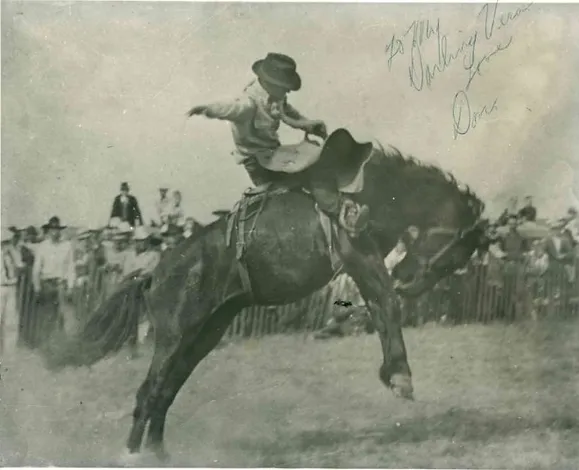A native of eastern Colorado, Don was born June 12, 1911. His parents, Fowler and Lodeska Bell were early day homesteaders. Fowler trained and sold horses to the United States Cavalry. The Bell’s raised four children; Alton, Lee, Clorene and Don. The kids all grew up riding horses. Don worked with livestock his entire life; entering his first rodeo at the age of 12, long before the cowboys organized an association. Don left home after eight years of school and spent the next 17 years as a rodeo contestant.
During the depression prize money was small and money scarce. Cowboys worked on ranches in the winter and hit the rodeo circuit in the spring and summer. He worked as a farrier, big game guide, packer and a range cowboy. A showman at heart, in 1929 Don hired on with the Clyde Miller Wild West Show, the Bill King’s Rodeo Co. and rode for the Rufus Rollin’s Wild West Show. He contested rough stock events until 1942 competing in venues like Soldier’s Field in Chicago and the Boston Gardens.
In 1936, Bell went professional and joined the first organized cowboy union, Cowboy Turtles Association; the first Professional rodeo association. Don’s pin was #868. He was also an honorary life card holder of the Professional Rodeo Cowboys Association. Don rode rough stock events, saddle broncs and bulls.
In 1942 he was called to serve in WWII until being honorably discharged in 1945. Don served in the 29th Infantry Division, one of the first units to hit the beaches of Normandy France. Despite tremendous losses his infantry experienced, Don survived and became a decorated soldier earning two purple hearts and four bronze stars for his wartime bravery. Don would wear one of the bullets that struck him for the remainder of his life.
It may have been Don’s encounter in WWII meeting famous war correspondent Ernie Pyle in a fox hole that lead him to a path to writing. The famed correspondent told Don, “Anyone that can tell stories like you should be a writer.” Ernie Pyle left his old Corona typewriter in that fox hole while fleeing enemy fire. Like rescuing an old friend, Don retrieved that old typewriter from the fox hole and had it shipped back to the states. Years later he would donate it to the Albuquerque, New Mexico Museum where Pyle retired and where it still remains on display today.
After the war, Don came to Cody Wyoming making a living as a cowboy, shoeing, packing, and guiding hunters. He also opened a livery stable with Pete Peterson. Don guided hunters for Max Wilde, Henry and Frances Purvis, Skip Glomb, and Deer Creek Ranch; packing in artists and movie stars to the mountains. This is where he met the famous movie star Janet Gaynor, someone he adored from afar. Asking him to throw a double diamond hitch on the top of her car to secure all baggage was a story his daughters heard growing up. Don spent the majority of his working years up and down the South Fork of the Shoshoni River outside of Cody, shoeing horses, working on cattle ranches, and packing in hunters.
He married Elvira Bell, a farmer’s daughter and raised three girls in this great state of Wyoming. When Don retired he started writing of his war and rodeo experiences. His articles have appeared in Western Horseman, the Ketchpen (the official publication of the Rodeo Historical Society), Guideposts Magazine and True West. Don was also a chosen poet for the Cowboy Poetry Gathering in Elko, Nevada.
Don spent years writing about rodeo history, inducting eight women into the Cowgirl Hall of Fame and four Cowboys into the Cowboy Hall of Fame, wanting true cowboys and cowgirls to never be forgotten; doing this all from his typewriter in Big Horn County, Byron, Wyoming.
Don’s vintage bronc riding saddle sits in the Smithsonian Institute’s American History Museum in Washington D.C. Today, his bronc riding spurs reside in the Cowboy Hall of Fame. In 2000 Don was inducted into the Legends of Sports Hall of Fame in Arlington, Texas. Don’s love for rodeo and all it stood for never faded. After retiring from the rodeo and cowboy world, his writing career spanned 30 years and he was still being published at the age of 93.
In addition to his public achievements, it was his never-ending love of life and positive attitude Don shared with so many that he will be most remembered.
From his hospital bed, Guideposts magazine reprinted for their 60th anniversary, “The Lonely Trail” first published in 1976 making the front cover of the magazine. Caught in a howling blizzard with lost horses in the Absaroka Mountain range above Cody, Wyoming; after bringing down some hunters, he went back in to look for three lost horses. “People who don’t live here just don’t know how bad a Wyoming blizzard can be.”
Don was the recipient of the Epoch Scribe Award given to him by the Rodeo Historical Society in 2002 for documenting rodeo history.
Don lived for every moment and told stories from his hospital bed. He reminded the doctors and us all; “I’ll ride this storm until it takes me home.” He died April 21, 2005 just shy of his 94th birthday.


